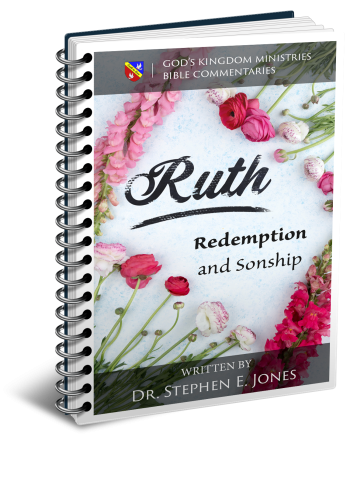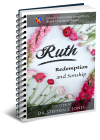Latest Posts
View the latest posts in an easy-to-read list format, with filtering options.

The book of Ruth is the Bible's primary illustration of the law of sonship found in Deuteronomy 25. The story also illustrates the principles of New Covenant marriage as God set forth from the beginning. In addition, it is a natural sequel to the last five chapters of the book of Judges, showing the moral contrast between the home towns of Saul and David as a way of explaining the failure of Saul and the success of David.
Category - Bible Commentaries

Ruth’s ephah of barley was worth five shekels of silver, which was the normal wage for ten days of labor. Laborers were normally paid a half shekel per day. Five is the biblical number for grace, and ten is the number of the divine order (law).
An ephah, as I said earlier, was a tenth of a homer, and Lev. 27:16 says, “a homer of barley seed [is valued] at fifty shekels of silver.” An ephah, then, was worth five shekels of silver weighing approximately 1.3 ounces.
An omer was also the amount of grain necessary to feed a man his daily bread. That is why God gave each Israelite an omer of manna daily in the wilderness (Exodus 16:16). So Ruth received in one day enough to feed ten men.
Boaz gave Ruth both law (10 days) and grace (5 shekels), or, as I would say, he manifested the law of grace, which is the Jubilee. The law of Jubilee demands that everyone should return to their lost inheritance. In this case, Naomi’s inheritance had been sold for debt, and she did not have the means by which to redeem it. Nonetheless, Ruth’s gleanings became a daily promise of Jubilee.
More importantly, Naomi had no heirs to inherit the lost estate, even during a year of Jubilee. But God was about to extend grace to her through Boaz. He was soon to marry Ruth and give Naomi a son to inherit the estate (Ruth 4:17).
Ruth 3:1 says,
1 Then Naomi her mother-in-law said to her, “My daughter, shall I not seek security [manoakh] for you, that it may be well with you?”
The Hebrew word manoakh means “rest, security, a quiet settled spot, i.e., a home.” It is also the name of Samson’s father (Judges 13:2). Its root word is Nuwakh, or “Noah,” who was named because “This one will give us rest [nuwakh] from our work and from the toil of our hands” (Gen. 5:29).
In the story of Ruth, the word manoakh refers to a secure home for Ruth that would give her rest. This was Naomi’s plan, although no doubt her ultimate goal was to obtain an heir for her deceased husband. In the long-term plan of God, this also looked ahead toward the coming of the Messiah, who was the embodiment of the Jubilee and who was to give rest to the entire earth as a second “Noah.”
Ruth 3:2-4 gives us Naomi’s plan:
2 “And now is not Boaz our kinsman, with whose maids you were? Behold, he winnows barley at the threshing floor tonight. 3 Wash yourself therefore, and anoint yourself and put on your best clothes, and go down to the threshing floor; but do not make yourself known to the man until he has finished eating and drinking. 4 And it shall be when he lies down, that you shall notice the place where he lies; and you shall go and uncover his feet and lie down; then he will tell you what you shall do.”
It was much cooler to winnow the barley in the evening. The grain was tossed into the air to allow the breeze to blow away the chaff. We should note that chaff falls away very easily from barley grains, whereas wheat must be threshed to remove its chaff. This signifies that the overcomers (“barley company”) shed fleshly things easily through the action of the Holy Spirit (ruach, “wind”).
The church in general (“wheat company”) requires more effort, for it seems that they are more attached to the desires of the flesh.
Naomi told Ruth to bathe after her long day in the field. She was then to dress attractively in clean clothes, put on some perfume (essential oils) and go to the threshing floor after Boaz was finished working and after he had finished his evening meal. She knew that Boaz would remain there all night, partly to guard the field from thieves, and partly to get an early start in the morning.
Ruth was to observe from a distance where Boaz would lie down, and only then was she to make her move. She was to “go and uncover his feet and lie down.” This rather bold move was essentially to let Boaz know that she wanted to marry him. Under normal circumstances, her actions would have been considered to be highly improper. Some even claim that uncovering his feet was a mere euphemism for having sexual relations with him, but such an interpretation certainly goes too far.
Naomi could plan no further, because from that point on, it would depend upon Boaz’ reaction. Would he accept her implied offer of marriage? All Naomi could say was “then he will tell you what you shall do.” In other words, at that point it will be up to him, and you will know by his reaction what to do next.
Ruth 3:5, 6 continues,
5 And she said to her, “All that you say I will do.” 6 So she went down to the threshing floor and did according to all that her mother-in-law had commanded her.
Ruth’s words remind us of Israel’s response to God’s marriage proposal at Mount Horeb in Exodus 19:5-8, where Israel said in verse 8, “All that the Lord has spoken we will do!”
Ruth 3:7 says,
7 When Boaz had eaten and drunk and his heart was merry, he went to lie down at the end of the heap of grain; and she came secretly and uncovered his feet and lay down.
Boaz had both bread and wine, and so “his heart was merry.” This usually means that a man has had plenty of wine to drink (1 Sam. 25:36; 2 Sam. 13:28; Esther 1:10). Boaz then “went to lie down at the end of the heap of grain.” After a long day of work, it did not take long for him to fall asleep, and only then did Ruth go to him. It is likely that if any others remained in the field, they too were asleep by this time, for the story says nothing of their presence or interference.
Ruth 3:8 continues,
8 And it happened in the middle of the night that the man was startled and bent forward [sat up]; and behold a woman was lying at his feet.
This implies that Boaz was unaware of Ruth’s presence until the middle of the night. That alone tells us that she had not had sexual relations with him but had instead remained literally at his feet. Boaz “was startled,” when he felt something at his feet. Being wakened out of a deep sleep, he probably thought that an animal had taken shelter there. The Hebrew word is charad, “to be fearful, tremble,” but the context shows that “startled” is probably the best rendering of the word.
Boaz sat up immediately and was surprised to find a young woman lying at his feet. It was too dark to see who she was. Ruth 3:9 says,
9 And he said, “Who are you?” And she answered, “I am Ruth your maid. So spread your covering [kanaf] over your maid, for you are a close relative [ga’al].”
No doubt this is just a brief summary of the exchange of words, but essentially, she asked Boaz to cover her with the border of his robe. Kanaf literally means “wing, border, corner, end.” In Num. 15:38 the word is twice translated “corner,” saying,
38 Speak to the sons of Israel and tell them that they shall make for themselves tassels on the corners [kanaf] of their garments throughout their generations, and that they shall put on the tassel of each corner [kanaf] a cord of blue.
Num. 15:39 tells us that this blue tassel on the corners of one’s garment signified the law, which they were to remember each time they saw the tassel. The fact that it was as blue as the sky (or heavens) signifies that “the law is spiritual” (Rom. 7:14).
Ruth asked Boaz to cover her with the corner of his garment and the blue tassel of the law. She also informed him of his duty as a ga’al, a redeemer. Whatever else was said, Boaz knew the law in Deut. 25:5-10 and understood the significance of his lawful obligation to raise up seed unto his deceased brother (or relative). By asking him to cover her with the law-tassels of his garment, she was asserting her right—and his lawful duty—to be her covering.
Ruth 3:10, 11 says,
10 Then he said, “May you be blessed of the Lord, my daughter. You have shown your last kindness to be better than the first by not going after young men, whether poor or rich. 11 And now, my daughter, do not fear. I will do for you whatever you ask, for all my people in the city know that you are a woman of excellence.”
Apparently, Boaz was not a young man. He even refers to Ruth as “my daughter.” If she were in her twenties, he was probably in his forties or even older. In fact, there is little doubt that he already had a wife and children who would inherit his own property. His responsibility as a kinsman redeemer was to provide an heir for Elimelech’s property, not his own.
Boaz was probably attracted to Ruth earlier during the day but did not think that she might want to marry him. His kindness was not designed to cause her to fall in love with him, although kindness is certainly an attractive quality that many women greatly appreciate.
Boaz then tells her, “I will do for you whatever you ask.” Here we are told specifically that Ruth had been the one proposing to Boaz. He follows with a compliment, telling her that the whole town knew that she was “a woman of excellence.” The KJV renders this, “a virtuous woman.” The Hebrew word chayil is actually translated “army” 56 times in the KJV. It literally means “strength, valor, ability, efficiency, or integrity.”
Word spreads fast in a small town, but Ruth’s reputation for strength and integrity was unusual, perhaps because the people marveled that a Moabitess could manifest such characteristics.
However, an impediment to their marriage yet had to be overcome. Ruth 3:12 says,
12 And now it is true I am a close relative [ga’al]; however, there is a relative [ga’al] closer than I.